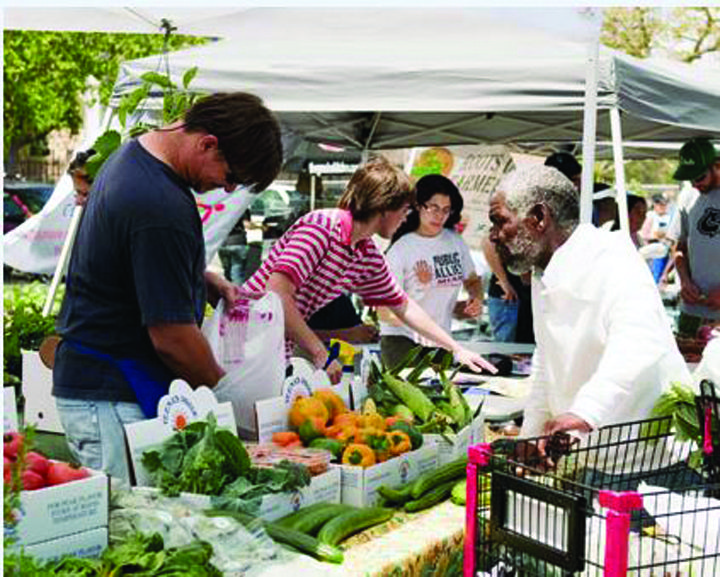
The month of March marks the end of winter and officially welcomes spring, a season that can be seen differently by different people.
Personally, my mind goes straight to green. Not because of St. Patrick’s Day (although you do see plenty of green around that day) but because it is the time that plants and crops awaken from the dormancy of winter. And what better way to honor nature’s finest gifts to us than by giving a little back?
There are many ways that one can be green, and a good place to start is with small tweaks to our day-to-day routine. As a nutritionist, I want to share with you healthy tips that will make you feel good in more ways than one. Both your body and the environment will greatly benefit when you implement these tweaks. Quite the sweet deal, right?
Tip 1: Buy Local
There is something magical about going to a farmers’market. It’s quite the unique experience; you can’t find it anywhere else. As you walk from stand to stand, a light breeze will bring your way the different aromas while your eyes can enjoy a festival of vivid colors.
Here are a few reasons why you should schedule frequent visits to your local farmers’ market:
• Locally grown crops are picked at their peak of ripeness, meaning that you will get the most flavorful produce.
• Time between harvest and your table is significantly shorter, making food more nutritious.
• Less environmental impact and smaller carbon footprint because of shorter transit time.
• You are supporting your local farmers.
During the spring there are countless markets around town. Check your local paper and don’t forget to bring your reusable bags.
Tip 2: Know your Dirty Dozen
There is a great movement towards food transparency and finding natural foods. Organic food seems to be everywhere these days, but what does it mean for something to have the USDA Organic stamp?
Organic agriculture, by the USDA definition, “produces products using methods that preserve the environment and avoid most synthetic materials, such as pesticides and antibiotics.” October of this year will mark the 13th anniversary of the USDA Organic seal, and to carry this seal means that both farms and processors are preserving natural resources, supporting animal health and welfare, using approved materials and are not using genetically modified ingredients.
Buying organic is a great way to be green and get more nutritious foods but at the same time it is not the most affordable. If you are choosing to get only some organic foods, make sure to know your Dirty Dozen. This elist includes produce that has tested with the highest amount of pesticides. It’s a good idea to go organic on these. They are: apples, strawberries, grapes, celery, peaches, spinach, sweet bell peppers, nectarines, cucumbers, cherry tomatoes, snap peas, and potatoes. This list is published annually, so for you to be in the know of the most accurate Dirty Dozen, be sure to check out the website for the Environmental Working Group.
Tip 3: Cook for the week
Cooking your meals, believe it or not, is probably the healthiest thing you can do for yourself. Think about it: you have complete control of what is going in your food. You can tailor things to your taste and, to me, eating home-cooked meals is the true definition of eating natural.
With today’s busy schedule, however, it is hard to find enough hours in the day to prepare a healthy home-cooked meal. This is why nutritionists suggest picking one day to cook a few meals for the week. Devoting a few hours during the weekend to cook two or three dishes will allow you to have deliciously homemade foods for the week.
You might be wondering where the “green” part comes in. Maybe you haven’t thought much about this but, by making your own meals instead of eating frozen ones, it is one less box or plastic bag that you would be tossing into the environment. The same premise applies to takeout. Oh, and don’t forget to pack your lunch in a glass container instead of plastic, and use a lunchbox instead of paper bags to take your lunch to work or school.
Tip 4: Quench your thirst with water
When looking for healthier eating habit tweaks, a really simple switch is choosing water over soda or bottled juice. Water will provide you with all of the benefits, including energy and hydrating skin at no cost, especially when it comes to calories. Remain environmentally friendly by getting a refillable stainless steel or glass bottle instead of buying bottled water. It doesn’t take a deep online search to find how plastic has become a burden to our oceans, animals, and the environment in general.
Tip 5: Tone up those legs
Being physically active is integral to maintaining a healthy lifestyle, and yet sometimes we just forget about it. The No. 1 excuse is finding the time to workout, but there are others. Some people believe that to get in shape you have to go to the gym. To many, it’s just not an appealing place. This is when little tweaks come in.
Take walks with your significant other, friends, and kids. It’s a great way to get moving, to catch up with good conversation, and clear the mind. Another great way to get in shape is by running your errands either by bike or foot instead of using your car.
Did you know that there now is an official World Car-free Day? An entire car-free day may be difficult to implement every day, but try running your errands car-free, you will be making an impact on your body and on the planet.
So let’s be green and healthy together.
Raisa Cavalcante is a nutritionist at PureFormulas.






